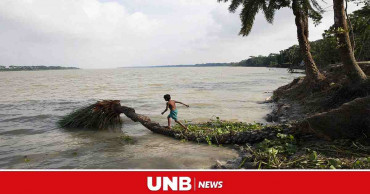climate resilience
Project launched to boost climate resilience, food security in Cox’s Bazar
The government of Bangladesh has taken a project aimed at strengthening the resilience and livelihoods of poor and marginal communities in Cox’s Bazar, one of Bangladesh’s most disaster-prone districts, through sustainable, nature-based solutions.
The project, titled “PRO-ACT Bangladesh – Resilience Strengthening through Agri-Food Systems Transformation in Cox’s Bazar,” will be implemented by the Department of Agricultural Extension (DAE) under the Ministry of Agriculture and is set to run until June, 2028.
With an estimated cost of Tk 53.01 crore, fully funded by foreign grants, the project seeks to improve food and income security, promote sustainable agriculture, and reduce disaster risks in four upazilas — Cox’s Bazar Sadar, Ramu, Ukhiya, and Teknaf.
Under the initiative, 10,000 farmers will receive training and input support to cultivate nutrient-rich crops, while 600 families involved in aquaculture will be trained in modern fish-farming techniques.
Besides, 1,050 farmers will be supported in toxin-free dry fish processing including branding and market access development.
Read more: Access to credit for agri sector can enhance food security: Bangladesh Bank Governor
The project also envisions creating five agricultural aggregation centres to boost market connectivity and promote ICT-based agricultural extension services.
Local service providers and farmers’ groups will be trained on financial literacy, digital tools, and business planning to improve access to agricultural credit and strengthen value chains.
To enhance disaster preparedness, communities will receive training on the Landslide Early Warning System (LEWS) and crop-based land use maps will be developed to integrate disaster risk reduction into agricultural planning.
According to the Planning Commission, the project will play a pivotal role in mitigating the adverse effects of climate change and addressing the environmental degradation worsened by the Rohingya refugee influx — including deforestation, land erosion, and waterlogging.
Funded by the European Union and implemented in collaboration with the Food and Agriculture Organization (FAO), Forest Department, and Department of Fisheries, PRO-ACT Bangladesh focuses on restoring ecosystems and strengthening the adaptive capacities of vulnerable populations.
With a target to reach more than 54,000 beneficiaries, including smallholder farmers, women, and marginalised groups, the initiative aims to transform Cox’s Bazar’s agri-food systems through climate-smart agriculture, sustainable resource management, and inclusive economic opportunities.
Officials said the project aligns with Bangladesh’s long-term climate adaptation goals and underscores the government’s commitment to building a resilient future in the face of worsening climate challenges.
Read more: Bangladesh's food security at risk as farmland shrinks by 3.75 percent in 8 Years: BBS Survey
Cox’s Bazar is facing frequent exposure to a wide range of natural hazards and extreme weather conditions such as cyclones, heavy rainfall, landslides, flash floods and storm surges.
In recent years, the district has been particularly vulnerable to recurring landslides and cyclones.
The severity of these disasters is worsened by widespread poverty and the limited coping capacity of local communities — with about 33 percent of the district’s population living below the poverty line, according to UNDP.
Since 2017, Cox’s Bazar has also hosted around one million Rohingya refugees, which has significantly increased the population at risk.
The influx has contributed to new environmental and safety challenges, including deforestation, hill-cutting, and mounting pressure on infrastructure. Because of overcrowded settlements, hilly terrain, and temporary housing conditions, Rohingya families are particularly susceptible to severe weather events.
Read more: Dream project derails; Khulna-Mongla railway struggles without freight flow
3 months ago
Bangladesh, Sweden sign deal to strengthen climate resilience, biodiversity protection
Bangladesh and Sweden have signed a grant agreement to implement a new project aimed at strengthening Bangladesh’s resilience to climate change and enhancing biodiversity protection.
The project, funded by Swedish International Development Cooperation Agency (SIDA), will support the Ministry of Environment, Forest and Climate Change, the Department of Environment (DoE), and the Bangladesh Forest Department (BFD) in improving natural resource management and climate resilience.
Environment Advisor Syeda Rizwana Hasan said the project will play a vital role in addressing environmental and climate challenges through institutional capacity building and innovative measures.
She made the remarks after receiving the grant agreement at a ceremony held at the Department of Environment in Dhaka on Thursday.
Hard-earned opportunity for reform shouldn’t be wasted: Ali Riaz
The agreement for the project, titled “Strengthening Capacity of MoEFCC, DoE, and BFD for Natural Resource Management and Improved Climate Resilience”, was signed by Dr. A.K.M. Shahabuddin, Secretary (Routine Charge) of the Economic Relations Division (ERD), and Maria Stridsman, Chargé d’Affaires and Head of Cooperation at the Embassy of Sweden.
Funded by a SIDA grant of SEK 5 million (approximately USD 0.53 million or BDT 64.4 million), the project will focus on three key components-building institutional capacity, improving monitoring of Ecologically Critical Areas (ECAs), and launching Bangladesh’s first Wildlife Trust Fund.
Under the initiative, specialized training on environmental impact assessments will be provided, and the DoE will be equipped with modern tools to monitor pollution in critical rivers, including the Buriganga and Turag.
Besides, priority will be given to restoring Sonadia Island, an important ECA, through baseline environmental assessments, mangrove restoration, sand dune stabilization, and establishing a turtle hatchery. Local communities will be engaged through the formation of Village Conservation Groups (VCGs) to support these efforts.
8 months ago
Govt approves 29 new projects under BCCTF to combat climate change
The government has approved 29 new projects under the Bangladesh Climate Change Trust Fund (BCCTF) to address the growing threats posed by climate change.
The approval was granted at the 62nd meeting of the Trustee Board, held at the Ministry of Environment, Forest and Climate Change on Thursday.
Chaired by Environment Adviser Syeda Rizwana Hasan, the meeting was attended, among others, by Lieutenant General (retd.) Jahangir Alam Chowdhury, Adviser to the Ministries of Home and Agriculture; Sharmin S. Murshid, Adviser to the Ministries of Women and Children, and Social Welfare; Cabinet Secretary Dr Sheikh Abdur Rashid; Secretary of Environment Dr Farhina Ahmed; and Secretary of Finance Dr Md Khairuzzaman Mozumder, among other high-ranking officials.
These new projects have been designed to strengthen climate resilience, conserve the environment, and promote sustainable agricultural and urban development.
Key initiatives include research on carbon emissions and climate-resilient agriculture in Bangladesh’s haor wetlands, as well as the development of eco-friendly technologies to enhance dairy production.
Adviser Rizwana urges unified global action to tackle climate change
The impact of climate change on plant phenology in four ecological hotspots will also be studied.
Besides, the projects will focus on improving onion seed storage and production, adopting climate-smart agricultural technologies in char, haor, and coastal regions, and restoring water bodies in major urban centres like Dhaka, Chattogram, Khulna, Rajshahi, and Sylhet.
Afforestation along five canals in Narayanganj and conservation efforts in Gazipur’s Lobonadaha Canal are also planned.
To ensure access to clean drinking water in remote regions, solar-powered deep tube wells will be installed in the hill tracts of Rangamati, while safe drinking water initiatives will be introduced for affected communities in Bandarban.
Other notable projects include subsidised jute bags as an alternative to plastic, expansion of palm and mangrove plantations, biodiversity conservation, and research on antibiotic-resistant bacteria.
The projects will be implemented by various government agencies and research institutions, including the Chittagong Hill Tracts Development Board, the Department of Genetic Engineering and Biotechnology at the University of Chittagong, the Department of Public Health Engineering, the Bangladesh Agricultural University, the Bangladesh Livestock Research Institute, and the Department of Environment, among others.
Hilly areas neglected in climate change interventions: Rizwana
Speaking at the meeting, Adviser Syeda Rizwana Hasan emphasised the need for a coordinated approach to tackling climate change. She expressed optimism that these projects would not only drive sustainable development but also ensure significant progress in environmental conservation and biodiversity protection.
11 months ago
Coastal Towns Climate Resilience: ADB approves $250 mn for Bangladesh
The Asian Development Bank (ADB) and the government of Bangladesh have signed agreements for $250 million in loans to strengthen climate and disaster resilience in 22 coastal towns in Bangladesh.
Sharifa Khan, Secretary, Economic Relations Division, and Jiangbo Ning, Deputy Country Director, ADB, signed the agreements on behalf of Bangladesh and ADB, respectively on Monday.
“The project prioritizes local economic development in project towns by enhancing the livelihood resilience and adaptive capacity of vulnerable households through the graduation program in six project towns with high poverty levels,” said Deputy Country Director Jiangbo Ning.
Read more: ADB to fund urban transport, climate resilience, renewables projects worth $628 million
“The project will support the Government of Bangladesh in achieving integrated and sustainable urban development to improve the livability of coastal towns in the face of increasing climate-related disaster risks,” Deputy Country Director Jiangbo Ning.
The assistance under the Coastal Towns Climate Resilience Project will develop infrastructure for building climate resilience in coastal towns, including infrastructure to improve urban flood risk management such as stormwater drainage, nature-based solutions, water body restoration, and integrated waste management. Cyclone shelters with early warning systems will be established, taking into account the needs of the elderly, women, children, and persons with special needs.
Bridges, culverts, and roads with stormwater drainage will be constructed and rehabilitated.
A comprehensive set of interventions in six project towns will be implemented to help vulnerable households, especially poor women, cope with climate shocks and develop livelihood resilience.
These include climate risk assessment for diversifying livelihoods, household skills and resources mapping, enterprise and employment matching, and provision of livelihood training.
Read more: Bangladesh mandates ADB to advise on $400million expressway connecting 10 economic zones
The project will strengthen the knowledge and capacity of the Local Government Engineering Department and the project towns in managing climate and disaster resilience.
They will be trained on nature-based and green solutions, gender equality and social inclusion-responsive climate and disaster risk sensitive master planning, and information technology-based remote monitoring to inform risk-based urban development plans and develop mitigation measures.
The project will also enhance public awareness to prepare for future emergencies and crises.
The ADB financing includes $246 million in regular and concessional loans and a $4 million grant from the Asian Development Fund. The Government of Bangladesh will contribute $60 million.
3 years ago
Continued investment in coastal resilience critical for sustainable growth: World Bank
With increasing climate risks, Bangladesh needs to continue investments to strengthen climate resilience in the coastal zones to protect the development gains, says a new World Bank report launched on Monday.
The report, “Bangladesh: Enhancing Coastal Resilience in a Changing Climate” highlights the country’s journey to reducing vulnerability to climate change and recommends further actions towards improving the resilience of its coastal region.
It analyzes the drivers of risks, how the government has reduced these risks, and offers new perspectives and innovative solutions.
Also read: World Bank to provide US$300 million to help Bangladesh’s pandemic response
Despite vulnerability to climatic risks, Bangladesh has emerged as a global leader in climate change adaptation and is known for proactively investing in resilience. It shows how long-term investments in disaster risk reduction save lives, reduce economic losses, and protect development gains.
This was possible due to a range of initiatives backed up by a strategic policy framework, from grassroot-level adaptation and community-based early warning systems to structural investments in infrastructure complemented by nature-based solutions and fostering innovation. Since independence in 1971, Bangladesh has reduced cyclone-related fatalities by 100-fold.
However, a rapidly growing population, environmental degradation, and increasing climate risks are putting pressure on the existing natural and infrastructure systems in the coastal zone which is home to about 40 million people. Bangladesh needs to take further immediate actions to improve resilience.
“Coastal resilience is not a static goal to be met, but rather a continuous process of adapting to changing conditions and finding synergies between development objectives,” said Dandan Chen, World Bank Acting Country Director for Bangladesh and Bhutan.
“For the last fifty years, the World Bank has supported Bangladesh to build climate resilience and improve disaster risk management. Today, the country shares valuable experience in improving disaster preparedness and climate resilience and is an inspiration for other climate-vulnerable nations,” Chen said.
The report finds that further investments in coastal resilience would produce an array of economic, social, and environmental benefits for Bangladesh.
It lays out seven key recommendations to strengthen the resilience of the coastal region, including strengthening operation and maintenance of infrastructure; recognizing local knowledge; and utilizing state-of-art modeling tools.
Given the changing climate and dynamic coastal processes, a risk management framework should act as the guiding principle for adaptive delta management.
Also read: World Bank happy, congratulates Bangladesh on Padma Bridge
Infrastructure investments need to be complemented with nature-based solutions.
The coastal area can benefit from inclusive community participation and livelihood adaptation for sustainable resilience.
Lastly, establishing an integrated framework that goes beyond risk reduction and includes growth, well-being, and sustainable development at its core.
“Given the significant investment need, we can learn from past interventions and find innovative solutions. This report provides a first-of-its-kind analysis of all large investment projects since the 1960s”, said Swarna Kazi, World Bank Senior Disaster Risk Management Specialist and co-author of the report.
“A key lesson learned is that there is huge potential in Bangladesh for nature-based solutions or hybrid solutions with a mix of green-grey infrastructure,” added Ignacio Urrutia, World Bank Senior Disaster Risk Management Specialist and co-author of the report.
This report complements the forthcoming Bangladesh Country Climate and Development Report (CCDR), the World Bank Group’s new diagnostic report that integrates climate change and development considerations.
Since 1972, the World Bank is helping Bangladesh build coastal and climate resilience and disaster preparedness. The first five World Bank projects committed to Bangladesh in 1972, included support to improve disaster preparedness in the coastal area in the aftermath of deadly cyclone Bhola.
Currently, with an ongoing program of $1.9 billion, the World Bank is helping Bangladesh to build climate resilience through multipurpose cyclone shelters, embankments, early warning systems, weather services, and afforestation.
3 years ago
$ 80 billion planned for investment by 2030 to achieve climate resilience
Finance Minister AHM Mustafa Kamal has said that US$ 80 billion is being planned for investment by 2030 to achieve climate resilience.
Presenting his plan in parliament in his budget speech on Thursday, he said the government is going to implement the ‘Mujib Climate Prosperity Plan’, which is essentially a strategic investment framework for climate financing to move from climate risk to sustainable climate prosperity.
The investment will be funded by both domestic and external sources, he added.
He said that considering the immense importance of environmental protection, the government has made it mandatory to follow a pragmatic and inclusive environment-friendly plan in all development activities while addressing the risks of climate change.
As part of the implementation of the global carbon emissions reduction target, the country’s updated ‘Nationally Determined Contribution’ was finalised in August 2021.
By 2030, the target of reducing carbon-dioxide emissions has been set at 6.73 percent with the country’s own financing and technological capabilities.
Also read: Budget FY23: Tk5,000 crore earmarked to combat pandemic
Another 15.12 percent of this emission reduction has been provisioned subject to the availability of international funding and technical assistance.
On the other hand, the process of formulating a ‘National Adaptation Plan’ to determine the long-term integrated adaptation strategy together with an action plan to tackle the country’s climate change is at the final stage.
He said the updating of ‘Bangladesh Climate Change Strategy and Action Plan’ formulated in 2009 is in progress.
In addition, steps have been taken to make all existing industries and newly established industries environment friendly.
Following this, new decisions have already been taken on installation of 10 coal-fired power plants worth 12 billion USD with the generation capacity of 8,600 MW.
Of these plants 4 have been canceled and the remaining 6 will be renewable or gas-based, on the basis of a feasibility study. We are working on ensuring availability of 40 percent of our energy resources from renewable sources by 2041.
So far, 13 areas of the country have been declared as Environmentally Critical Areas on the basis of the finding of scientific studies aimed at conserving biodiversity and the natural environment, said the finance minister.
In the last 13 years, a total of 35 new protected areas have been created, including 9 National Parks, 18 Wildlife Sanctuaries, 3 Eco-parks, 1 Botanical Garden, 2 Marine Protected Areas, and 2 Special Biodiversity Conservation Areas, bringing the total number of protected areas in the country to 51, said the financial minister.
3 years ago
Govt. moves to boost climate resilience of vulnerable people, says official document
The government is finalising a project aimed at enhancing the climate resilience of vulnerable communities who live on coastal islands and riverine chars in the country.
The project titled, ‘Adaptation Initiative for Climate Vulnerable Offshore Small Islands and Riverine Charland in Bangladesh’ is under process for approval, according to an official document.
Spanning over five years, the project will be implemented by the Ministry of Environment, Forest and Climate Change following UNDP’s National Implementation Modality.
Read: COP26: Global competition launched to find top climate science communicators
This project has four components. First one is: Enhancing climate resilience of households through climate-resilient housing, electrification and climate-proof water provisioning, and the second is increasing climate resilience of communities through climate-resilient infrastructure, climate risk mapping and inclusive cyclone preparedness.
The third component is improving income and food security of communities by innovating and providing assistance to selected households for climate-resilient livelihoods practices while the 4th is boosting knowledge and capacity of communities, government and policymakers to promote climate resilient development on chars.
According to the project proposal USD 2,007,828 is needed for Component 1 whereas USD 2,317,726, USD 3,397,068 and USD 614,700 will be needed for Component 2, Component 3 and Component 4 respectively.
Project execution cost has been fixed USD 875,000 while Total Project Cost is USD 9,212,322.
Implementing Entity Project Cycle Management Fee Of the project is USD 783,047.
The US$ 9,995,369 has been sought from the Washington based Adaptation Fund (AF) to address the knowledge technical, financial and institutional barriers to climate-resilient housing, infrastructure and livelihoods, the document said.
4 years ago
Local community participation in climate change mitigation paramount: Minister
Environment, Forests and Climate Change Minister Md Shahab Uddin has pointed out that climate change is one of the biggest challenges to Bangladesh becoming the 25th largest economically prosperous country in the world by 2050.
"It is said that Bangladesh's economy is more at risk to climate change than any country," he said at the knowledge sharing workshop of the ICBAAR project at a hotel in Dhaka on Sunday.
He said that to sustain the economic growth, the government is emphasising climate change mitigation in its policies. "Therefore, in the National Adaptation Action Plan (NAPA) and the Bangladesh Climate Change Strategy and Action Plan (BCCAP), participation of local communities in climate change mitigation has been considered paramount."
He said the Ministry of Environment, Forest and Climate Change has taken initiatives for green budget for all ministries.
Also read: 'No time to waste': A clarion call for action against climate change
UNDP initiated integrating community-based Adaptation into Afforestation and Reforestation Program (ICBAAR) in 2017 to increase species diversity in the coastal forest, which resulted in enhanced socio-economic benefits to local communities from the forests.
It was supported by the Ministry of Environment, Forest and Climate Change and implemented through the Bangladesh Forest Department in collaboration with seven ministries and departments of government, with the financial support from Global Environment Facility (GEF)
For the last four years, the project has been providing climate-resilient, innovative and ecosystem-based diversified livelihood support to 8,600 coastal, poor and forest-dependent households to adapt to climate change, said UNDP.
The project makes a conscious effort to empower women and their involvement in advancing resilience in coastal areas, of which over 52 percent are women.
Also read: Swedish minister happy with Bangladesh’s use of climate change adaptation support
"ICBAAR activities have piqued the interest of the coastal communities, and many are adapting to innovative livelihood options introduced by the project. I hope these activities are rolled out to other coastal areas of Bangladesh for overall strengthening of the vulnerable population," the minister said.
Appreciating the project interventions, Deputy Minister Habibun Nahar said, "I believe the Project learnings, best practices and knowledge products can be included in future Coastal Climate Change planning, which will make today's effort more fruitful."
"Adopting a green, clean production agenda will be imperative if Bangladesh wants to meet export-led growth ambition in the post-LDC graduation period," said UNDP Resident Representative Sudipto Mukerjee.
"This is the forests that protect us from cyclones and climate impacts. Now it is our moral responsibilities to protect them," he added.
Also read: Global Youth Climate Summit 2021 urges pressing actions to combat climate change
"ICBAAR was successful in building key strategic partnerships, cooperating with relevant institutions, and building linkages with other projects. The project adopted co-management approach and acted as a platform of collaboration for multiple government, non-government organisations and individuals, which represents an excellent recipe for future replication on other projects or to other areas."
"We must seize the opportunity to properly utilise the enormous project learnings generated through concerted efforts of various sectors," the UNDP RR said.
The workshop was chaired by the ministry’s Secretary Ziaul Hasan while Chief Conservator of Forest Amir Hossain Chowdhury was the special guest. UNDP's Program Specialist Arif M Faisal and ICBAAR Project Manager Dr Muhammed Muzammel Hoque gave keynote presentations.
4 years ago
WB okays $120 mn to help Bangladesh improve food security
The World Bank has approved $120 million to help Bangladesh improve food security by enhancing climate resilience and productivity of irrigated agriculture and fisheries.
4 years ago
People walk in Cox’s Bazar demanding climate, gender justice
Dozens of women, men and young people walked along the Cox’s Bazar beach on Tuesday demanding climate and gender justice.
5 years ago









.jpg)






